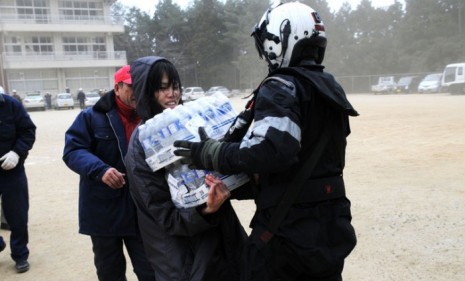Japan's radioactive tap water and 3 other new risks
Japanese officials set off warning bells in Tokyo by reporting that the city's tap water could imperil infants. And that's not the only contamination risk sparked by the nuclear crisis

A free daily email with the biggest news stories of the day – and the best features from TheWeek.com
You are now subscribed
Your newsletter sign-up was successful
After discovering dangerous levels of radiation in the tap water in Tokyo and surrounding areas, Japanese officials have warned parents to prevent their infants from drinking it — triggering a run on bottled water. Radioactive fallout from the struggling nuclear reactors in Fukushima prefecture has also prompted restrictions on agricultural products in Japan and several other countries. How dangerous are the contamination risks for Japan's reeling population? Here, a brief guide:
1. Tap water
Tokyo's water officials said Wednesday that they'd found dangerous levels of radioactive iodine-131 — 210 becquerels per liter, to be precise — in the city's drinking water. Although levels up to 300 becquerels per liter are considered safe for adult consumption, anything over 100 becquerels is a risk for babies. Officials pledged to deliver bottled water to the 80,000 homes with kids under age 1, but people in Tokyo and surrounding areas didn't wait around, emptying store shelves of bottled water. Though iodine levels had dipped back to 79 becquerels by Thursday, city officials said that "continued monitoring of the situation is essential."
The Week
Escape your echo chamber. Get the facts behind the news, plus analysis from multiple perspectives.

Sign up for The Week's Free Newsletters
From our morning news briefing to a weekly Good News Newsletter, get the best of The Week delivered directly to your inbox.
From our morning news briefing to a weekly Good News Newsletter, get the best of The Week delivered directly to your inbox.
2. Vegetables
Dangerous levels of radioactive contamination were found in 11 kinds of vegetables in Fukushima and neighboring Ibaraki prefecture. The Japanese government ordered those two prefectures, plus two more, to halt all shipments of affected vegetables, and restricted sales from six other surrounding prefectures. U.S. health experts agreed that the recorded radiation levels in these green leafy veggies don't pose much of a health risk, but a Japanese official still warned that people should "refrain from eating them as much as possible, as a precaution."
3. Milk
Dairy products are perhaps the biggest health concern, especially for Japan's children. In the U.S., milk that was contaminated by the 1986 Chernobyl nuclear plant disaster — cows ate grass blanketed in radiation, and kids drank the milk — is blamed for at least 6,000 cases of thyroid cancer so far. The U.S., Singapore, and Hong Kong have banned milk products from the four worst-hit prefectures, and Japan has suspended raw milk shipments from Fukushima and Ibaraki. That's a bit of an overreaction, says U.S. health physicist Peter Caracappa. He estimates you'd have to drink 58,000 glasses of tainted Japanese milk to raise your lifetime cancer risk by 4 percent.
A free daily email with the biggest news stories of the day – and the best features from TheWeek.com
4. Seafood
The high levels of radiation in the seawater around the Fukushima reactors are a big threat to Japan's multibillion-dollar seafood industry, and several Asian countries have already banned Japanese seafood. Japan insists that no fish are being caught anywhere near the reactors, and that they're diligently testing seafood, and have found no dangerous levels of radiation. A U.S. sushi chain's refusal to buy Japanese fish is an "overreaction," says Edward Flattau at The Huffington Post. But radiation could still increase as it moves up the food chain, from small fish to bigger ones, "insidiously concentrating at the top where we reside."
Sources: New York Times, Reuters, The National, The Daily Yomiuri, CNN, VPR, Bloomberg, Huffington Post
-
 Bondi, Democrats clash over Epstein in hearing
Bondi, Democrats clash over Epstein in hearingSpeed Read Attorney General Pam Bondi ignored survivors of convicted sex offender Jeffrey Epstein and demanded that Democrats apologize to Trump
-
 Are Big Tech firms the new tobacco companies?
Are Big Tech firms the new tobacco companies?Today’s Big Question Trial will determine if Meta, YouTube designed addictive products
-
 El Paso airspace closure tied to FAA-Pentagon standoff
El Paso airspace closure tied to FAA-Pentagon standoffSpeed Read The closure in the Texas border city stemmed from disagreements between the Federal Aviation Administration and Pentagon officials over drone-related tests